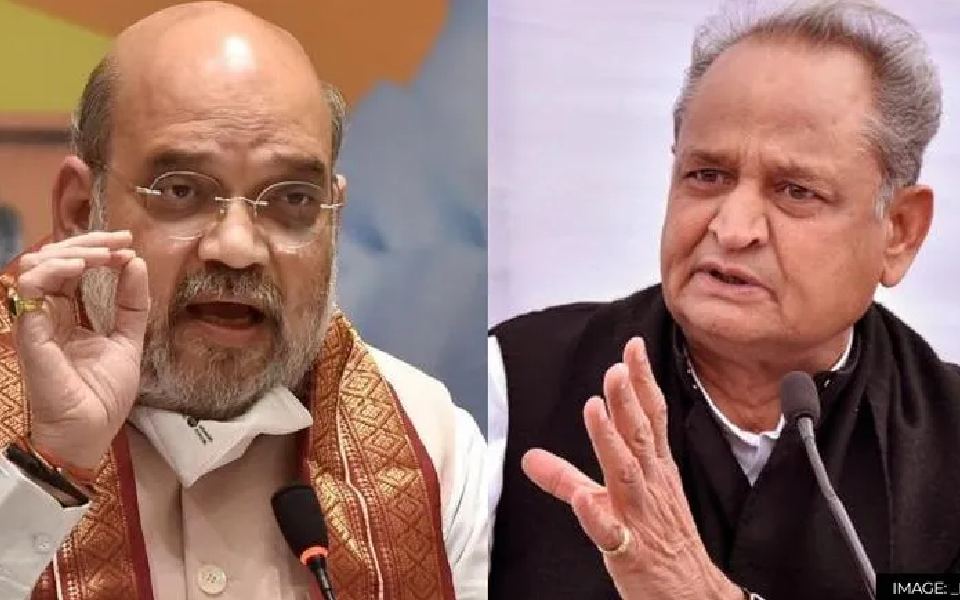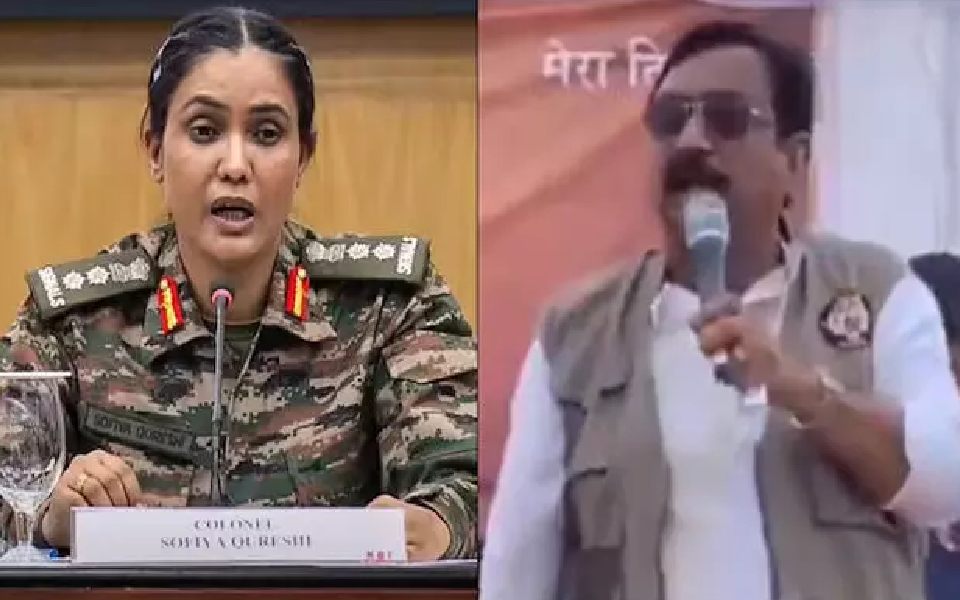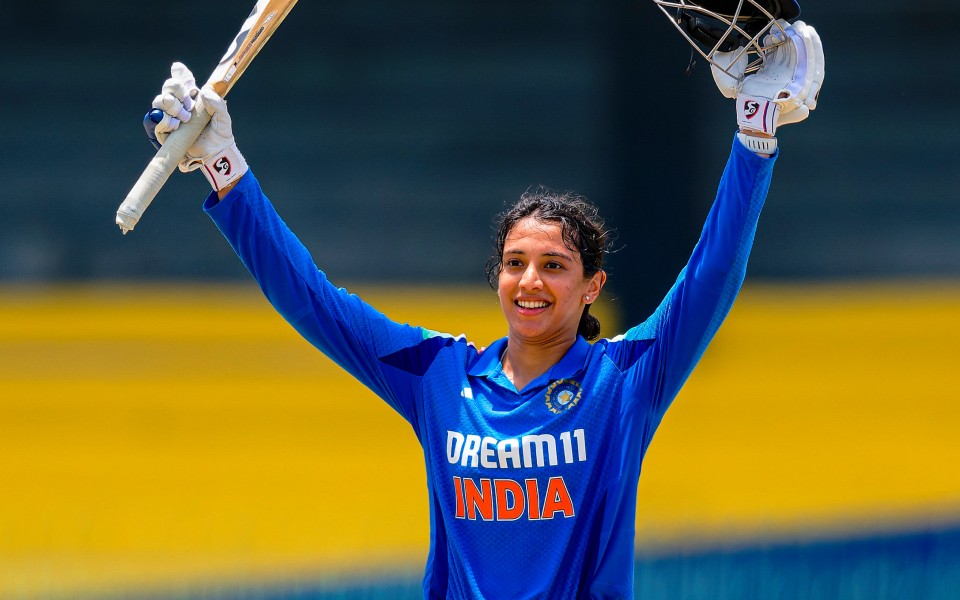Jaipur, Jun 30: Rajasthan Chief Minister Ashok Gehlot on Friday said Union Home Minister Amit Shah's claim that the NIA arrested the accused in the Kanhaiya Lal murder case was a "lie" and added the state police nabbed them within four hours of the crime in Udaipur.
Soon after Shah made the claim while addressing a rally in Udaipur, the chief minister hit back at him and said he would probably be aware that the two accused were "active BJP workers".
He also demanded an inquiry to expose the "BJP leaders" who helped the accused.
Kanhaiya Lal, a tailor, was murdered on June 28 last year by two men who had accused him of insulting Islam after he allegedly posted content on social media in support of suspended BJP leader Nupur Sharma.
Referring to the incident, Shah told the rally in Udaipur that the Ashok Gehlot government did not even want to catch the accused and the NIA had caught them.
Gehlot sharply reacted to his remarks and tweeted in Hindi, "It is expected that people holding responsible positions will not do politics on a serious issue like terrorism but what Union Home Minister Amit Shah did in Udaipur today is an irresponsible act."
He said that Shah "lied" that Kanhaiya Lal's killers Riyaz Attari and Ghous Mohammed were caught by the NIA.
"The truth is that they were caught by Rajasthan Police in just four hours of the incident. This tragic incident took place on June 28, 2022 while the file of this case was transferred to the NIA on July 2, 2022," the chief minister said.
Claiming that the accused duo were "active BJP workers", Gehlot said Shah "should get an inquiry done to ascertain who were the BJP leaders who helped these two, who used to call the police stations for them."
The chief minister also asked why did it take a long time to file a charge sheet in an open-and-shut case like this one and why have they not been punished yet.
Let the Truth be known. If you read VB and like VB, please be a VB Supporter and Help us deliver the Truth to one and all.
Bhopal/Indore, May 13 (PTI): Madhya Pradesh Minister and BJP leader Vijay Shah has sparked a major controversy with objectionable comments that appeared to be directed at Col Sofia Qureshi, whom he tried to project as a "sister of terrorists."
Under severe flak, Shah said if anyone is hurt by his statement, he is ready to apologise ten times, adding that he respects Colonel Qureshi more than his sister.
The Congress has appealed to Prime Minister Narendra Modi to sack Shah from the Madhya Pradesh cabinet.
Colonel Qureshi had conducted regular press briefings, sharing details of the 'Operation Sindoor' launched by Indian armed forces to strike terrorists, joined by Foreign Secretary Vikram Misri and Wing Commander Vyomika Singh.
"Those people (terrorists) who had wiped out the sindoor (vermilion) of our sisters (in the Pahalgam terror attack)..We avenged these 'kate-pite' people by sending their sister to destroy them," Shah said.
"They (terrorists) killed our Hindu brothers by making them remove their clothes. PM Modi ji responded by sending their (terrorists') sister in an Army plane to strike them in their houses. They (terrorists) made our sisters widows, so Modiji sent the sister of their community to strip them and teach them a lesson", the BJP leader said while addressing a gathering in Ramkunda village near Indore.
He said, "Revenge was taken for the honour of our country (India), respect, and for the (slain) husbands of our sisters by sending a sister from your (terrorists') community to Pakistan".
The tribal welfare minister clarified that his remarks should not be construed otherwise.
Shah's remarks drew wide-scale condemnation, with Congress demanding his immediate dismissal from the MP cabinet.
Congress President Mallikarjun Kharge said Shah, who made 'derogatory' remarks in reference to Colonel Sofia Qureshi, should be dismissed immediately.
"A minister of the BJP government of Madhya Pradesh has made a very derogatory, shameful and cheap remark about our brave daughter Colonel Sofia Qureshi. The terrorists of Pahalgam wanted to divide the country, but the country was united during the entire 'Operation Sindoor' to give a befitting reply to the terrorists," Kharge posted on X.
He alleged that the BJP-RSS harbours an anti-women mentality.
"First, the wife of the naval officer martyred in Pahalgam was trolled on social media, then the daughter of Foreign Secretary Vikram Misri was harassed, and now the BJP ministers are making such indecent comments about our brave woman Sophia Qureshi," Kharge said and appealed to PM Modi to immediately sack Shah.
Madhya Pradesh Congress president Jitu Patwari shared the video of Shah on X and asked whether the BJP agrees with the minister's "low thinking"?
The MP Congress Committee alleged that Shah's "indecent' and hate-filled" statement is not just a personal attack, but an open attack on India's military dignity, national unity, and women's honour.
Amid the raging controversy, the BJP's Madhya Pradesh general secretary Hitanand Sharma summoned Shah to the state headquarters in Bhopal.
According to sources, Sharma reprimanded the minister, who also met the state BJP president, Vishnu Dutt Sharma.
Speaking to reporters, Shah sought to attribute the intemperate remarks to his "disturbed" state of mind in view of the brutal killing of innocent people in Pahalgam by terrorists.
He claimed many members of his family have a military background and many were martyred.
"Sister Sophia has brought glory to India by rising above caste and religion. She is more respected than our own sister. I salute her for her service to the nation.
"We cannot even think of insulting her in our dreams. Still, if my words have hurt society and religion, then I am ready to apologise ten times,'' he added.
Meanwhile, Congress leader Manoj Shukla and the party workers blackened the nameplate of Shah at his bungalow and raised slogans seeking his resignation.
'हमारी सेना की जांबाज बेटियां आतंकवादियों की बहन हैं'
— Congress (@INCIndia) May 13, 2025
- ये घटिया बात मध्य प्रदेश में BJP सरकार के मंत्री विजय शाह ने कही है।
भारत की जिन बेटियों पर सबको नाज है, उन बेटियों को लेकर ये शर्मनाक बयान दिया गया है। उन्हें आतंकवादियों की बहन बताया गया है।
ये हमारी पराक्रमी सेना का… pic.twitter.com/y591M3ky8G





